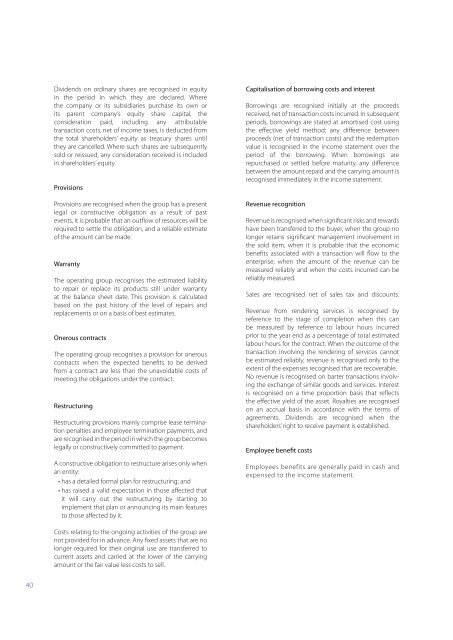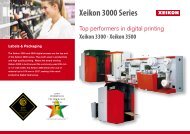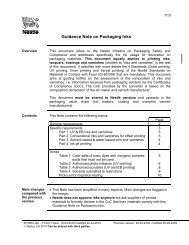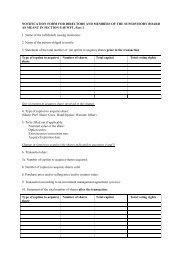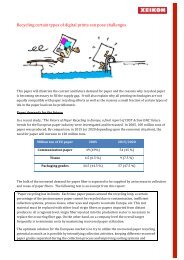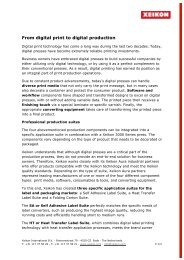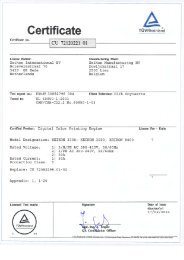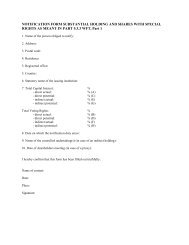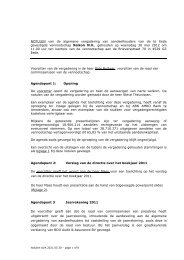Annual report 2005 - Xeikon
Annual report 2005 - Xeikon
Annual report 2005 - Xeikon
Create successful ePaper yourself
Turn your PDF publications into a flip-book with our unique Google optimized e-Paper software.
Dividends on ordinary shares are recognised in equity<br />
in the period in which they are declared. Where<br />
the company or its subsidiaries purchase its own or<br />
its parent company’s equity share capital, the<br />
consideration paid, including any attributable<br />
transaction costs, net of income taxes, is deducted from<br />
the total shareholders’ equity as treasury shares until<br />
they are cancelled. Where such shares are subsequently<br />
sold or reissued, any consideration received is included<br />
in shareholders’ equity.<br />
Provisions<br />
Provisions are recognised when the group has a present<br />
legal or constructive obligation as a result of past<br />
events, it is probable that an outflow of resources will be<br />
required to settle the obligation, and a reliable estimate<br />
of the amount can be made.<br />
Warranty<br />
The operating group recognises the estimated liability<br />
to repair or replace its products still under warranty<br />
at the balance sheet date. This provision is calculated<br />
based on the past history of the level of repairs and<br />
replacements or on a basis of best estimates.<br />
Onerous contracts<br />
The operating group recognises a provision for onerous<br />
contracts when the expected benefits to be derived<br />
from a contract are less than the unavoidable costs of<br />
meeting the obligations under the contract.<br />
Restructuring<br />
Restructuring provisions mainly comprise lease termination<br />
penalties and employee termination payments, and<br />
are recognised in the period in which the group becomes<br />
legally or constructively committed to payment.<br />
A constructive obligation to restructure arises only when<br />
an entity:<br />
• has a detailed formal plan for restructuring; and<br />
• has raised a valid expectation in those affected that<br />
it will carry out the restructuring by starting to<br />
implement that plan or announcing its main features<br />
to those affected by it.<br />
Capitalisation of borrowing costs and interest<br />
Borrowings are recognised initially at the proceeds<br />
received, net of transaction costs incurred. In subsequent<br />
periods, borrowings are stated at amortised cost using<br />
the effective yield method; any difference between<br />
proceeds (net of transaction costs) and the redemption<br />
value is recognised in the income statement over the<br />
period of the borrowing. When borrowings are<br />
repurchased or settled before maturity, any difference<br />
between the amount repaid and the carrying amount is<br />
recognised immediately in the income statement.<br />
Revenue recognition<br />
Revenue is recognised when significant risks and rewards<br />
have been transferred to the buyer, when the group no<br />
longer retains significant management involvement in<br />
the sold item, when it is probable that the economic<br />
benefits associated with a transaction will flow to the<br />
enterprise, when the amount of the revenue can be<br />
measured reliably and when the costs incurred can be<br />
reliably measured.<br />
Sales are recognised net of sales tax and discounts.<br />
Revenue from rendering services is recognised by<br />
reference to the stage of completion when this can<br />
be measured by reference to labour hours incurred<br />
prior to the year end as a percentage of total estimated<br />
labour hours for the contract. When the outcome of the<br />
transaction involving the rendering of services cannot<br />
be estimated reliably, revenue is recognised only to the<br />
extent of the expenses recognised that are recoverable.<br />
No revenue is recognised on barter transactions involving<br />
the exchange of similar goods and services. Interest<br />
is recognised on a time proportion basis that reflects<br />
the effective yield of the asset. Royalties are recognised<br />
on an accrual basis in accordance with the terms of<br />
agreements. Dividends are recognised when the<br />
shareholders’ right to receive payment is established.<br />
Employee benefit costs<br />
Employees benefits are generally paid in cash and<br />
expensed to the income statement.<br />
Costs relating to the ongoing activities of the group are<br />
not provided for in advance. Any fixed assets that are no<br />
longer required for their original use are transferred to<br />
current assets and carried at the lower of the carrying<br />
amount or the fair value less costs to sell.<br />
40


